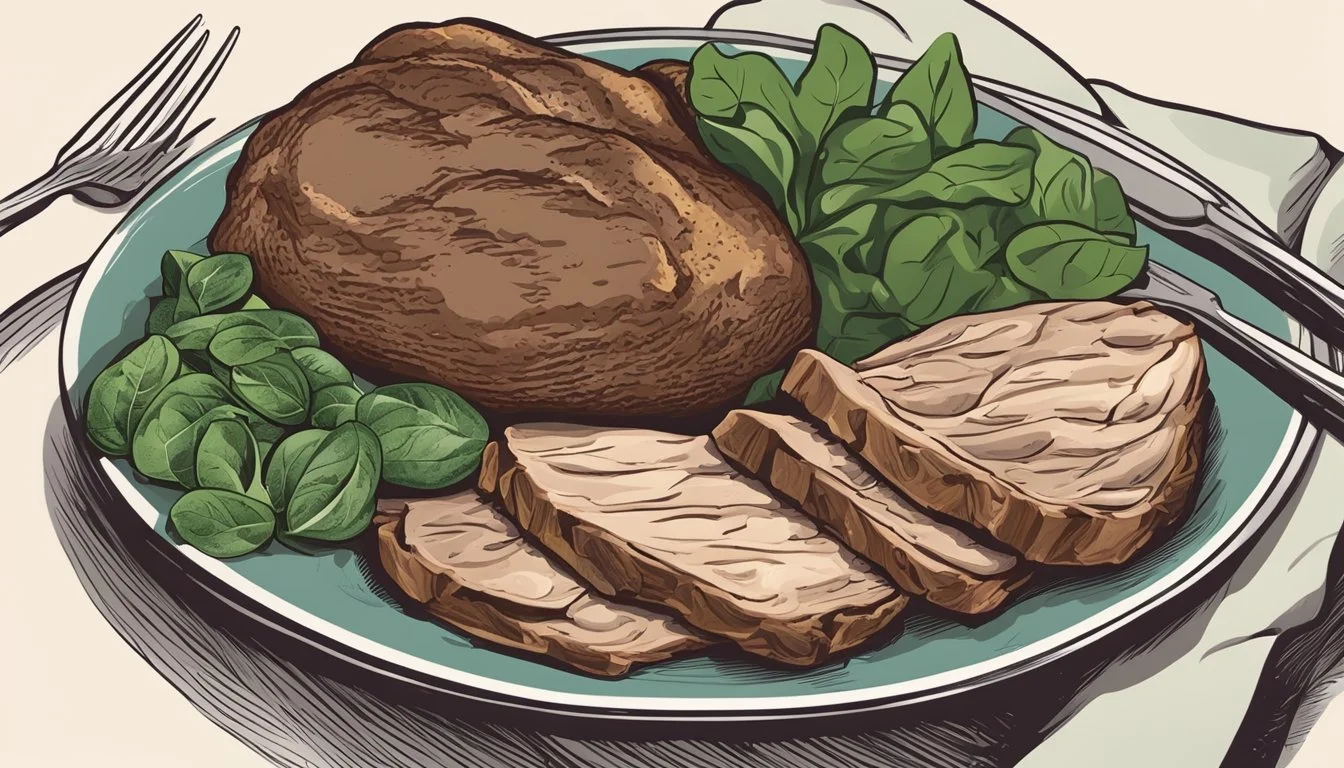8 Carnivore Diet-Friendly Foods for Better Heart Health
Essential Nutrients
The carnivore diet, which emphasizes the consumption of animal products while excluding plant-based foods, has gained attention for its potential health benefits, including those related to heart health. Proponents argue that focusing on high-quality meats, seafood, and certain dairy products can help manage cholesterol levels, regulate blood pressure, and reduce inflammation.
Understanding which foods align with the carnivore diet and how they contribute to heart health can empower individuals to make informed dietary choices. This article explores eight specific foods within the carnivore diet that may support a healthier heart, providing insights and practical guidance for those interested in this dietary approach.
1) Grass-Fed Beef
Grass-fed beef comes from cattle that graze on natural pastures rather than grain-based feeds. It offers a different nutritional profile compared to grain-fed beef.
One of the key benefits is the omega-6 to omega-3 ratio. Grass-fed beef typically has a lower omega-6 to omega-3 ratio. This balance is better for reducing inflammation and supporting heart health.
It also contains higher levels of conjugated linoleic acid (CLA). CLA has been linked to promoting fat loss and improving body composition. Additionally, grass-fed beef has more antioxidants, such as vitamin E, which benefits cardiovascular health.
Grass-fed beef is a rich source of essential nutrients. It provides ample amounts of protein, iron, and zinc. These nutrients are crucial for maintaining muscle function, oxygen transport in the blood, and immune system support.
For those on a carnivore diet, choosing grass-fed beef ensures intake of high-quality, nutrient-dense food. This type of beef aligns with the diet’s principles of consuming animal-based products while supporting heart health.
2) Wild-Caught Salmon
Wild-caught salmon is an excellent addition to a heart-healthy carnivore diet. Rich in omega-3 fatty acids, it helps reduce inflammation and supports cardiovascular health. These essential fatty acids are known to lower triglyceride levels and improve the function of blood vessels.
Beyond omega-3s, wild-caught salmon provides a substantial protein source. A 3-ounce (85g) serving of cooked wild-caught salmon contains around 17 grams of protein. This makes it a high-protein option, crucial for muscle growth and repair.
Vitamins and minerals in wild-caught salmon, such as B vitamins, selenium, and vitamin D, contribute to various bodily functions. B vitamins, in particular, aid in energy production and red blood cell formation, while selenium acts as an antioxidant.
Incorporating wild-caught salmon into the diet ensures intake of these vital nutrients. It provides essential macronutrients without the carbohydrates, aligning well with carnivore dietary principles. For those on a carnivore diet, it offers a nutritious and delicious way to support heart health.
3) Chicken Liver
Chicken liver is a nutrient-dense food that can enhance heart health on the carnivore diet. Rich in essential vitamins and minerals, chicken liver provides significant amounts of vitamin A, vitamin B12, iron, and folate. These nutrients play crucial roles in maintaining cardiovascular health.
Vitamin A supports cellular function and vision, while vitamin B12 is essential for red blood cell formation and DNA synthesis. Iron helps in oxygen transport within the blood, and folate assists in reducing homocysteine levels, a risk factor for heart disease.
Including chicken liver in the diet ensures an excellent intake of these important nutrients. It is advisable to incorporate organ meats like chicken liver regularly to maximize cardiovascular benefits.
Chicken liver is versatile and can be easily prepared in various ways. It can be sautéed, grilled, or even made into pâté. Cooking it correctly ensures that the nutritional value is preserved while making it palatable.
For those on the carnivore diet, chicken liver stands out as an efficient source of heart-healthy nutrients. Integrating it into meals can support overall cardiovascular function and contribute to a balanced carnivore eating plan.
4) Duck Breast
Duck breast is a versatile and delectable addition to the carnivore diet. Known for its rich flavor and tender texture, it can be a satisfying source of protein and healthy fats.
When choosing duck breast, opt for cuts with the skin on. The skin not only adds flavor but also provides additional nutrients, including essential fatty acids.
Duck breast is high in monounsaturated fats, which can support heart health by promoting healthy cholesterol levels. It also contains important vitamins and minerals, such as vitamin B6, niacin, and selenium.
Those following the carnivore diet can prepare duck breast in various ways, from roasting to pan-searing. Simple seasoning with salt and herbs can enhance its natural flavors without the need for complex marinades.
5) Pork Belly
Pork belly is a nutrient-rich option on the carnivore diet. This cut of meat provides significant amounts of essential vitamins and minerals, such as niacin, vitamin B6, and magnesium. These nutrients are crucial for heart health, supporting metabolic functions, and maintaining proper nerve function.
Cooking pork belly results in a flavorful and tender meat. One popular method involves roasting the meat. Preheat the oven to 450°F (230°C) and roast for 30 minutes. Then reduce the heat to 275°F (135°C) and continue roasting for 60-80 minutes. The result is a crispy exterior with a tender interior.
Alternatively, using an air fryer can also yield delightful results. Cut pork belly into bite-sized pieces, season with salt, and air fry at 390°F. Turn the pieces every 5 minutes during the 15-minute cooking process. This method ensures even cooking and a crispy texture.
In addition to its taste, pork belly's high-fat content fits well into the carnivore diet, which emphasizes fatty meats. Including pork belly in one's diet can offer a satisfying and nutrient-dense option while adhering to the diet's principles.
6) Venison Steaks
Venison steaks offer a lean, protein-rich option for those following a carnivore diet. They are low in saturated fat when compared to traditional red meats like beef, making them a heart-healthy alternative.
Packed with essential vitamins and minerals, venison provides high levels of iron and B vitamins. These nutrients support overall cardiovascular function and help in maintaining healthy blood levels.
Preparing venison steaks is relatively simple. Season with salt and pepper, and cook to your preferred doneness. Due to its low fat content, it's best to avoid overcooking to maintain tenderness and flavor. Venison can be grilled, pan-seared, or baked to suit different culinary preferences.
This meat is also rich in omega-3 fatty acids, which can aid in reducing inflammation and promoting heart health. Regular consumption of venison can contribute to a balanced intake of healthy fats.
7) Bison Meat
Bison meat, also known as buffalo meat, is an excellent addition to a carnivore diet. It is a lean source of protein, containing about 20 grams of protein per 100-gram portion.
This meat is low in calories and fat compared to beef. A 100-gram serving provides approximately 146 calories and 7 grams of fat.
Bison meat is rich in essential nutrients such as iron, zinc, selenium, and B vitamins. These nutrients contribute to heart health by promoting proper blood flow and reducing oxidative stress.
The unique, slightly sweet flavor of bison makes it a delicious alternative to traditional red meats. It can be grilled, roasted, or slow-cooked, making it versatile for various recipes.
Incorporating bison meat into a diet provides essential fatty acids. These fats support cardiovascular health by helping to maintain healthy cholesterol levels and reducing inflammation.
It's also noteworthy that bison meat has almost no carbohydrates or fiber. This makes it an ideal choice for those strictly adhering to the carnivore diet.
Bison’s nutrient density and lean profile make it a heart-healthy meat option. Consuming it alongside other nutrient-dense foods supports overall well-being.
8) Lamb Chops
Lamb chops make an excellent addition to a carnivore diet focused on heart health. Rich in protein, they provide around 25 grams per 100 grams, supporting muscle maintenance and overall health.
They are also a good source of essential minerals. Iron, present in significant amounts, aids in oxygen transport in the blood. Zinc, another vital mineral, supports immune function and wound healing.
Phosphorus, found in lamb chops, contributes to bone health. This mineral is crucial for maintaining strong bones and teeth. Additionally, lamb chops contain healthy fats that can help provide energy, especially when following a diet devoid of carbohydrates.
Cooking lamb chops can be done in various ways, such as grilling or pan-searing. The versatility in preparation methods allows for delicious and nutritious meals that fit seamlessly into a carnivore diet.
When selecting lamb chops, choosing high-quality cuts from grass-fed sources can enhance the nutritional benefits. Grass-fed lamb is often higher in omega-3 fatty acids, which are beneficial for heart health.
Regular consumption of lamb chops within the dietary guidelines can support various health aspects, making them a valuable component of a carnivore diet aimed at promoting heart health.
Nutritional Benefits of the Carnivore Diet
The Carnivore Diet, which includes only animal-based foods, can provide essential nutrients that support heart health. By focusing on nutrient-dense options, this diet aims to maximize the intake of vitamins and minerals necessary for maintaining a healthy heart.
Essential Nutrients for Heart Health
The Carnivore Diet includes foods rich in essential nutrients such as omega-3 fatty acids, vitamin B12, and CoQ10. Omega-3 fatty acids, found in fatty fish like salmon and mackerel, can help reduce inflammation and lower the risk of heart disease. Vitamin B12, abundant in red meat and organ meats, is crucial for maintaining healthy nerve and blood cells.
Another vital nutrient is CoQ10, found in organ meats like liver and heart. This antioxidant supports cellular energy production and protects against oxidative stress. Additionally, good sources of high-quality protein such as grass-fed beef and pasture-raised eggs provide amino acids necessary for muscle maintenance and overall cardiovascular health.
Comparing Nutrient Density to Other Diets
When compared to other diets, the Carnivore Diet stands out for its nutrient density. The inclusion of organ meats provides a higher concentration of vitamins and minerals than many plant-based foods. For example, beef liver contains substantial amounts of vitamins A, D, E, and K, along with iron, zinc, and selenium, which are less prevalent in vegetarian or vegan diets.
In contrast, plant-based diets often require careful planning to achieve similar nutrient intake levels. Many plant foods lack certain nutrients found abundantly in animal products. While the Carnivore Diet's exclusivity might raise concerns, its focus on nutrient-rich animal sources can offer a more efficient way to meet daily nutritional requirements for heart health.
Scientific Evidence on the Carnivore Diet and Heart Health
The carnivore diet, which consists mainly or exclusively of animal products, has been both praised for potential benefits and criticized for possible risks in cardiovascular health.
Studies on Cardiovascular Benefits
Several studies indicate potential cardiovascular benefits linked to the carnivore diet. Dr. Ovadia describes improvements in conditions like diabetes, obesity, and inflammatory diseases, which adversely affect heart health.
Research frequently emphasizes reduced insulin resistance, which can lower the risk of type 2 diabetes and metabolic syndrome. Early studies from Harvard also suggest ancestral diets, rich in animal fats and low in carbohydrates, were historically prevalent, leading to lower incidences of heart disease.
The reduction in hunger and improved satiety is another possible benefit. People following this diet often report eating less frequently due to prolonged feelings of fullness, which can result in weight loss—an important factor for cardiovascular health.
Potential Risks and Considerations
Despite potential benefits, significant risks exist. The carnivore diet is notably high in saturated fats and cholesterol. Excessive intake of these can negatively impact blood lipid profiles, raising concerns about long-term cardiovascular risks.
Additional research points to deficiencies in certain nutrients vital for heart health, such as fiber and vitamins C and E, which are naturally found in plant-based foods. Nutrient imbalances could counteract some of the cardiovascular benefits.
Furthermore, studies suggest that while some individuals may thrive on high-fat, low-carb diets, responses can vary greatly. Senstivities to elevated cholesterol and potential increases in arterial plaque are important to monitor.
To ensure heart health on a carnivore diet, regular medical check-ups and monitoring of cardiovascular markers are recommended. Adjustments based on individual metabolic responses are crucial for minimizing risks.
Practical Tips for Following a Carnivore Diet
Following a carnivore diet requires a focus on animal-based foods. To make this transition easier and more manageable, consider the following strategies:
Opt for a Variety of Meats
Incorporate different types of meat such as beef, pork, chicken, and fish. This helps ensure a range of nutrients and keeps meals interesting.
Include Organ Meats
Organ meats like liver and kidneys are nutrient-dense and can enhance the nutritional profile of the diet.
Choose Fatty Cuts of Meat
Fatty cuts of meat like ribeye and pork belly provide essential fats needed to sustain energy levels in the absence of carbohydrates.
Eggs and Limited Dairy
Eggs are a versatile addition, and small amounts of dairy such as cheese and butter can add variety. Ensure the dairy products are full-fat and minimally processed.
Avoid Plant-Based Foods and Carbs
Stick to animal-based foods and eliminate all carbohydrates, including fiber from plants and processed foods, to adhere to the zero-carb philosophy.
Stay Hydrated
Drink plenty of water to support digestion and overall health. Bone broth can also be a beneficial addition for hydration and electrolytes.
Dining Out Strategies
When eating out, choose animal-based sides like eggs or bacon. Request meals without sauces or ask for them on the side, as they often contain non-carnivore ingredients.
Meal Preparation
Preparation is key. Stock up on a variety of meats and plan meals in advance to avoid situations where non-carnivore foods might be tempting.
A table of some common carnivore diet foods:
Food Notes Beef High in protein and rich in nutrients Pork Good source of fat and protein Chicken Lean meat, choose darker cuts for fat Fish Provides omega-3 fatty acids Eggs Versatile and nutrient-rich Cheese (limited) Opt for full-fat varieties Butter Adds fats, use in moderation
These tips can simplify adherence to the carnivore diet while ensuring nutritional needs are met.
Long-Term Health Implications
Long-term health implications of the carnivore diet primarily focus on the absence of dietary fiber and diverse nutrients from plant-based foods.
The lack of fiber in a carnivore diet can affect gut health. Fiber is essential for maintaining healthy digestion and preventing constipation. It also plays a role in maintaining a healthy gut microbiome, which is linked to overall health.
Heart health is another concern. While animal fats provide essential nutrients, they also contain saturated fats, which, when consumed excessively, could impact cholesterol levels. Elevated cholesterol can increase the risk of heart disease over time.
Balancing nutrient intake is crucial. A diet heavy on meats might lead to deficiencies in vitamins and minerals typically found in fruits and vegetables, such as vitamin C, potassium, and magnesium. These nutrient gaps might affect various aspects of health, including immune function and bone health.
Potential Risks:
Gut Health: Lack of dietary fiber.
Heart Health: High intake of saturated fats.
Nutrient Deficiencies: Missing vitamins and minerals.
Careful monitoring and possibly supplementing the diet with essential nutrients is advisable for anyone considering a long-term carnivore diet. Consulting with healthcare professionals can also help mitigate potential risks associated with such restrictive diets.










